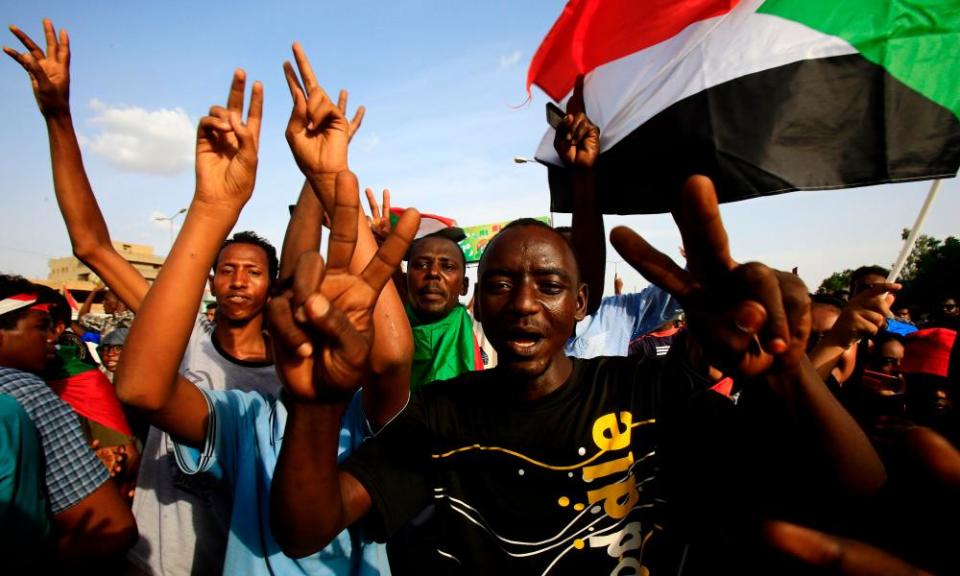Sudanese protesters demand justice following mass killings

Tens of thousands of demonstrators took to the streets of towns and cities across Sudan on Saturday calling for justice for pro-democracy protesters killed by security forces in weeks of unrest.
Crowds filled major squares and thoroughfares waving the national flag, lighting candles and chanting: “The mother of a martyr is my mother, the blood of a martyr is my blood.”
The political crisis in Sudan began last year and has lasted through the removal of the country’s long-term president in April, a military takeover and the brutal killing on 3 June by heavily armed paramilitary forces of at least 128 protesters who were staging a peaceful sit-in, as well as the rape of many more.
Hundreds marched to the east Khartoum home of one of those who died in the June attacks to greet his family.
Tawasol Noury, a 23-year-old doctor, said she had marched to remind both Sudan’s military rulers and the leadership of the pro-democracy movement “about the blood of the martyrs”.
The protests were the first since the ruling military council and civilian opposition agreed in principle to a power-sharing arrangement ahead of elections. The deal has yet to be finalised and signed, and there are fears that the military is now stalling.
A meeting between the two sides planned for Saturday was postponed to Sunday, a leader of the Forces for Freedom and Change (FFC) coalition said.
“We don’t want the FFC to forget so we are here to remind them that justice for the martyrs hasn’t come yet,” Noury said.
The majority of the killings have been blamed on the paramilitary Rapid Support Forces, which were deployed in force on Saturday around the headquarters of the Transitional Military Council (TMC), which took power after the fall of authoritarian ruler Omar al-Bashir after 30 years in power.
Security forces used barbed wire to block a main road leading to the site of the protest camp crushed by security forces on 3 June, a witness told Reuters.
Hundreds marched in Khartoum’s Burri neighbourhood, a working-class district and the focus of many of the earlier protests. Troops from the RSF stood on roads surrounding Burri, armed with sticks.
Ishraga Mohamed, a demonstrator, said the protest was “patriotic”. “We demand the right of the martyrs and accountability for their deaths,” she said.
At least 128 people were killed during the raid and in the two weeks that followed, according to doctors linked to the opposition. The government confirmed at least 61 deaths.
Despite continuing violence against them, protesters have returned to the streets again and again, including last weekend when seven were killed and hundreds wounded in the first major demonstrations since the 3 June massacre. Across the Blue Nile, hundreds protested in the neighbourhoods of Shambat and al-Mazad in Khartoum North. In Khartoum’s twin city of Omdurman, hundreds demonstrated on al-Arbaeen Street, a major artery.
Thousands also turned out in Wad Madani, the capital of Jazeera state. Hundreds more protested in Port Sudan, capital of Red Sea state, and al-Ubayyid, capital of North Kordofan.
African Union mediator Mohamed Hassan Lebatt said on Thursday the TMC and the leaders of the pro-democracy coalition would meet over the weekend to study and ratify a constitutional declaration. They had agreed to a political declaration that determines the transition’s different institutions, he said.
The worst of the violence has been blamed on Gen Mohamed Hamdan Dagalo, the deputy head of the TMC and head of the RSF. Dagalo has said the killings were the work of “infiltrators … within the Rapid Support [Forces].”
Under the new agreement, the military will lead a sovereign council first, with the head of the junta, Abdel Fattah al-Burhan, as its chair, and then civilians will take over.
The council will be made up of five military and five civilian members, as well as a sixth so-called civilian agreed upon by both sides who will actually be a retired military officer, according to reports.
An independent investigation into the killings has also been announced, and anyone found guilty will not be allowed to sit on the sovereign council.
There were reports on Saturday that military leaders were attempting to add a new clause to the agreement that could provide many of those blamed for the violence against demonstrators with some form of immunity.
Beginning in the eastern city of Atbara in December, the uprising is often said to have been triggered by a rise in bread prices but has much deeper roots. It follows in a long tradition of revolution in Sudan, dating from before the 30-year presidency of Omar al-Bashir. In 1964 and 1985 unpopular leaders were forced from power by popular revolts.

